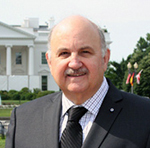
WASHINGTON, D.C. — The shooting on Sunday, January 3, at the Starrville Methodist Church in East Texas would not have happened had not the Church’s pastor not been carrying a gun. The suspect, Mytrez Deunte Woolen, was able to disarm the pastor, Mark McWilliams, 62 before shooting and killing him.
This is not the first shooting in a church, but it is the first where a pastor was armed and confronted a man who was hiding in the church’s bathroom after escaping a police hunt.
There has been a debate in the United States, subdued somewhat by the COVID-19 pandemic that emptied churches, synagogues, mosques and temples. Some said that one way to stop active shooters would be for congregants to arm themselves. Some church leaders supported the idea –in fact, in Texas a law was passed exempting gun carry restrictions on churches. Whether the pastor at Starrville got his gun based on the Texas law or for other reasons, we do not know.
We do know two things in general terms. The first is that this is not the first time that a church leader has taken security into his or her own hands. We know, too, that the results of congregants carrying arms has had mixed results, including innocent deaths.
Most religious bodies in the United States have remarkably poor security. Even though attacks on religious institutions have been growing, and despite the fact that the Federal government has significantly increased funds to offset security costs for faith-based institutions, congregations have been reluctant to take basic steps to protect themselves and their buildings.
For example it is quite clear that the number of church, synagogue and mosque arson attacks has grown significantly during the current pandemic. There is rarely a day that goes by without another church, synagogue or mosque burnt down. I maintain a special Facebook page called Security for Holy Places (facebook.com/secholyplaces) where new stories on attacks on or at religious institutions are reported daily. Readers are advised to go have a look –when you see the number of holy places attacked, here in the United States and around the world, you may be shocked.
Virtually none of the buildings hit by arson attacks are protected by security guards, or even security services. Many of them have surveillance cameras, and where the video is preserved the assailants can sometimes be identified –but this is after the damage is done.
Still fewer have guards posted at the buildings, even during religious services.
There is also a dynamic in the religious world to use churches as places of refuge, either for political reasons to protect illegal immigrants (sanctuary churches), or to provide shelter for the homeless. Church leaders ought to know that such practices are exceedingly risky. Unvetted illegal immigrants and homeless persons may be harmless, but then again they may be insane persons, criminals, drug dealers, rapists –even murderers. No religious body should invite unknown persons into their buildings without some kind of vetting system and without full time armed professional guards on the premises. And even with vetting and guards, there is significant risk to staff and to members of the congregation.
Religious bodies should be defended –and the best defense is professional security guards, preferably retired or off duty police or retired military, provided all of them are properly trained to deal with a crisis within or around a church. Unfortunately, there is a strong movement in the United States against police (“defund the police”) which adds to the reluctance of some religious organizations to hire professionals. Given the rise in attacks on religious bodies, the defund police movement and the hostility to police officers is bad news for the security of religious places.
Conversely the worst defense is untrained amateurs with guns. That Pastor McWilliams paid the price with his life should be ample warning that amateurs with guns, no matter how well motivated, can lead to tragedy.
*
Stephen D. Bryen is a former U.S. Defense Department deputy undersecretary.